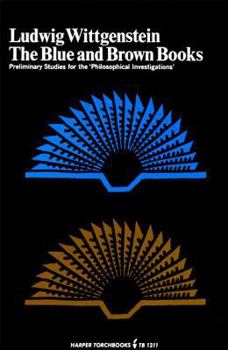The Blue and Brown Books
Select Format
Select Condition 
Book Overview
These works, as the sub-title makes clear, are unfinished sketches for Philosophical Investigations, possibly the most important and influential philosophical work of modern times. The 'Blue Book' is a set of notes dictated to Witgenstein's Cambridge students in 1933-1934: the 'Brown Book' was a draft for what eventually became the growth of the first part of Philosophical Investigations. This book reveals the germination and growth of the ideas which found their final expression in Witgenstein's later work. It is indispensable therefore to students of Witgenstein's thought and to all those who wish to study at first-hand the mental processes of a thinker who fundamentally changed the course of modern philosophy.
Format:Paperback
Language:English
ISBN:0061312118
ISBN13:9780061312113
Release Date:January 1965
Publisher:Harper Perennial
Length:208 Pages
Weight:0.42 lbs.
Dimensions:0.6" x 5.3" x 8.0"
Customer Reviews
4 ratings
Essential for understanding the P.I.
Published by Thriftbooks.com User , 18 years ago
The Blue & Brown Books are fun to read. They establish most of the concepts that are discussed in the P.I. These concepts are notated below, along with page numbers. My notes below indicate the page numbers where these concepts occur in the B & B Books, as well as in the P.I. If you read the B & B Books, you will have a relatively easy time recognizing the concepts (but not necessarily understanding them), as they are set forth, when you read the P.I. You will know what to look out for. Additionally, it seems that much of the first 50 pages of the P.I. is spent not doing philosophy, but is spent reflecting about philosophy. This 50 page span of reflection is apt to be particularly confusing, unless one first reads the B & B Books. The end-result of reading the B & B Books that is: When you proceed to read the P.I., you will feel self-assured and happy in recognizing the same concepts, and new variations of these concepts, that appear in the P.I. To summarize, W.'s philosophy first of all shows how the grammar of our language makes us think that mental acts (or mental processes, mental images, or feelings), of which we are conscious, are required for our various language games. Again and again, W. discloses paper experiments demonstrating that mental acts (of which we are conscious) are not at all required for language games. Next, W. explains how our various language games are like games, where these language games include: meaning, understanding, referring, commanding, and so on. W. devotes much space to providing exercises disclosing different classes of language games, where the exercises are meant to convince us that there is no essential mental act (of which we are conscious). Finally, W. provides an answer as to what is essential for a word to transmit meaning, understanding, reference, a command, a request, and the like. However, W. provides only a sketchy answer, namely, that the answer lies in some institution or use. NOTES MENTAL ACT OR MENTAL PROCESS. Notion that meaning, referring, understanding, depends on a mental image or a mental process. Wittgenstein explains how the grammar of the layperson gives birth to this notion. Wittgenstein explains that this is a false notion and, at times, makes fun of this notion. a. The mental image or mental process is like consulting a paradigm or prototype (page 128, 165, 166 of B & B Books); b. The mental image or mental process is like consulting a table (page 100 of B & B Books); c. The mental image or mental process is like "accompaniment of another," "some kind of addition" (page 168, 169 of B & B Books). Wittgenstein reveals what the layperson believes understanding and imagination to require a mental image or mental process. Wittgenstein says that the layperson exclaims: "But when I image something, something certainly happens!" (page 97 of PI). d. "You say to me: "You understand this expression . . . as if the sense were an atmosphere ac
Changed my life
Published by Thriftbooks.com User , 23 years ago
If I can recall the one book that influenced my thoughts, even my life, more than any other, it would have to be Wittgenstein's Blue Book. It is THE reason to ever learn how to read!
Resplendent, explosive...
Published by Thriftbooks.com User , 24 years ago
If you've never read Wittgenstein, bear down; and soon enough you'll cry, and shout, and praise God--blessed are the hours this man lived! Make room on your bedside table, tear out and fold the pages so you can carry them in your pocket; invest in your enlightenment.
Foundations of the Philosophical Investigations
Published by Thriftbooks.com User , 26 years ago
This volume is an excellent introduction to themes developed in the Philosophical Investigations. Many of the ideas of Wittgenstein's later thought are already here in their final form; others develop through the two very differrent books included in this one volume. Because some of his important views are not mentioned in either the blue or brown books, the best way to discover his views is to read the Philosophical Investigations.





